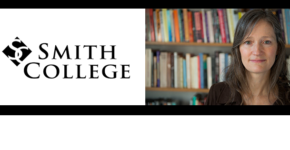 Abortion may be legal in a state, but that doesn’t mean access is easy.
Abortion may be legal in a state, but that doesn’t mean access is easy.
Carrie Baker, professor in the program for the study of women and gender at Smith College, outlines the hurdles.
Carrie N. Baker is the Sylvia Dlugasch Bauman Chair of American Studies and a professor in the Program for the Study of Women and Gender at Smith College. Baker holds a BA in philosophy from Yale University, a JD from Emory University School of Law, and an MA and PhD from Emory University in Women’s, Gender and Sexuality Studies. Her scholarship and teaching centers on gender, race, law and policy in the United States, focusing in particular on sexual harassment, sex trafficking, and reproductive justice. She serves on the steering committee of the Five College Certificate in Reproductive Health, Rights and Justice, of which she is a co-founder and former co-director. She is a regular writer and contributing editor at Ms. magazine, where she serves as co-chair of the Ms. Committee of Scholars.
Barriers to Medication Abortion Among Massachusetts’ Public University Students
Despite the fact that abortion is legal in Massachusetts, access is limited. Public university health centers in the state don’t provide medication abortion, so students have to find providers off-campus.
Using a cross-sectional study design, we estimated the number of students who need medication abortion and calculated the distance and public transit time from campuses to the nearest abortion-providing facilities. We contacted these facilities to determine costs, wait times, and weekend appointment availability.
Our research estimates that 600 to 1,380 Massachusetts public university students obtain medication abortion services each year. To reach off-campus providers, students have to travel between 2 and 42 miles, with a population-weighted average distance of 19 miles. Travel time on public transportation to reach the nearest abortion-providing facility takes between 18 and 400 hundred minutes, with a population-weighted average of 103 minutes.
Distance and travel time is a significant barrier to medication abortion access for many students. For example, 79 percent of students at the largest University of Massachusetts campus (in Amherst) do not own cars, yet the nearest abortion facility is 25 miles away and takes 2 hours and 18 minutes one way to reach by public transportation.
Cost, delay and scheduling are also barriers. Average cost of medication abortion is $680, average wait time for the first available appointment is 8 days, and 8 of the 13 nearest abortion-providing facilities to campuses are not open on weekends.
This research suggests that public university students in Massachusetts face logistical barriers to obtaining medication abortion. These barriers fall most heavily on female students and low-income students, who are disproportionately students of color. Offering medication abortion on campus would reduce these barriers and enhance gender, racial and economic equity on campus.

Comments
4 responses to “Carrie Baker, Smith College – Barriers to Medication Abortion Among Massachusetts’ Public University Students”